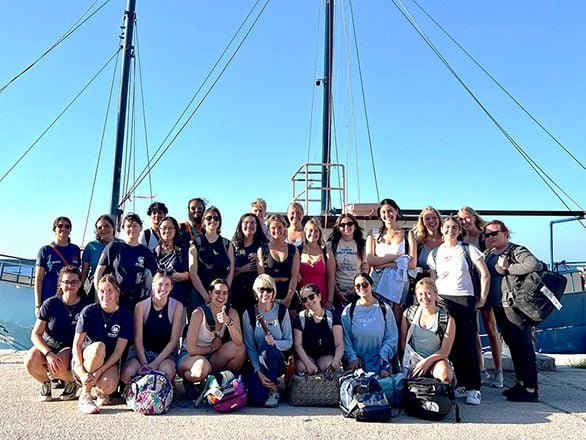
Conservation Issues Confronting the Mediterranean Sea and Sustainable Solutions: An Interdisciplinary, Project-Based Approach (Athens, Samos)
The Mediterranean Sea is a region of significant biodiversity, but it has also been experiencing biodiversity loss at an alarming rate due to overfishing, habitat destruction and fragmentation, pollution, climate change, and invasive species. The cumulative effect of these anthropogenic pressures has led to not only a decline in the Mediterranean’s biodiversity but the deterioration of its ecosystems. Conservation efforts and sustainable management practices are crucial then to mitigate further biodiversity loss and preserve the unique marine life of the Mediterranean Sea.
Students in this class will study, and connect with, the biodiversity of select ecosystems in the Mediterranean Sea of Greece. Using a multidisciplinary approach, they will simultaneously work to unravel the science concepts, conservation realities, and local, national, and global sustainability issues that surround the decline of species in the Mediterranean’s fragile waters. Additionally, they will be given the opportunity to explore and develop a deeper and more enriched understanding of the intensifying anthropogenic pressure of plastic pollution.
To accomplish the above course objectives, participants will venture into classrooms and laboratories, and field-based environments to learn from local, national, and international experts, researchers, and faculty about sustainability, conservation, environmental biology, marine biology, and even, international policy and law using various teaching modalities. They will also work side-by-side scientists and conservationists from two non-governmental organizations, Archipelagos Institute for Marine Conservation on the Greek island of Samos, and Archelon Sea Turtle Protection Society at the rescue centers in Glyfada, Athens, and nesting sites in Kyparissia Bay. Importantly, throughout this four-week course, students will be engaged in a group-based Problem-based Learning (PBL) project through faculty mentorship and creative inquiry.
Highlights of this Course:
1) Learn the key elements of conservation science and sustainability through a review of core concepts by leading researchers, conservationists, and specialists and the work of organizations such as the Society for Conservation Biology (SCB), International Union for Conservation of Nature (IUCN), Hellenic Centre for Marine Biology (HCMB), and the United Nations (Sustainable Development Goals).
2) Conduct authentic research with Greek scientists and conservationists, and Penn State faculty on microplastics and microplastic pollution in the Aegean Sea to quantify the extent of their contamination and understand how the byproducts of their decomposition in marine ecosystems affect habitats and species.
3) Gain science process skills and methods, critical thinking skills, career skills (teamwork, cultural awareness, adaptability, oral and written communication), and build relationships and network with faculty, scientists, and community stakeholders.
4) Participate in conservation work to protect endangered species in the Mediterranean Sea, plastic cleanup efforts, etc.
5) Through problem-based learning techniques and mentorship, engage in an transdisciplinary and group project which will allow you to use your creative talents and the knowledge gained in this course to advocate for environmental justice and to better our world.
6) Immerse yourself in Greek culture, geography, and history which you can explore in your free time.
7) Explore ways to incorporate components of social justice, conservation, and sustainable development into your future career trajectory.
Course Details
Enrollment: This course requires a minimum enrollment of 10, with a maximum enrollment of 20.
Credit 60 contact hours
Essential Information
The course starts and ends in Athens. Transportation between Athens and Samos as well as during day excursions is included in the course fee.
Enrolled students will have access to detailed information prior to departure that will include directions to the Academic Center and other practical information about the course. CYA recommends the following websites for general information about Athens and Greece: http://www.athensguide.com/ and http://www.greektravel.com/
IMPORTANT NOTE: This course involves extensive travel. Be wary of overpacking. Pack only what you can carry comfortably, because you will be required to check- in and out of accommodations for each stay / travel segment of this course. In addition, while on Samos island, you will spend your days on a research boat with limited storage space. It will also be useful to bring with you travel-size cosmetics. Here is a comprehensive packing list.
Enrolled students will have access to detailed information prior to departure that will include directions to the Academic Center and other practical information about residing in Athens. CYA recommends the following websites for general information about Athens and Greece: http://www.athensguide.com/ and http://www.greektravel.com/.
Housing
Students are housed within walking distance of the CYA Academic Center in either CYA student apartments located in the Pangrati neighborhood of central Athens or in hotel accommodations arranged by CYA. CYA apartments are simply furnished and equipped with a full kitchen and air-conditioned bedrooms; towels, linens and housekeeping service will be provided. Hotel accommodations will be in simple 2- or 3-star hotels, double- or triple-occupancy, with air-conditioned rooms. While on Samos, students will be housed on board an Archipelagos research/conservation vessel in quad cabins.
Facilities
The CYA Academic Center is located next to the Athens Marble Stadium and houses classrooms, the library, the student lounge and cafeteria, computer facilities (including wireless access for those students who choose to bring laptop computers), laundry facilities, and administrative offices. The Academic Center is accessible Monday-Thursday 9:00 a.m.-8:00 p.m., Friday 9:00 a.m.-6:00 p.m.
Meals
When class is in Athens a full mid-day meal will be served weekdays in the CYA cafeteria between the hours of 12:00-3:00 p.m. While traveling, breakfast will be offered at the Hotel. A welcome and a farewell dinner are also included in the course fee.
Day-to-day Program & Itinerary
The day-to-day program and itinerary of the course are subject to change. Students are advised not to make plans for their free time or weekends in advance, as class schedules and site visits may be re-scheduled depending on local conditions.




